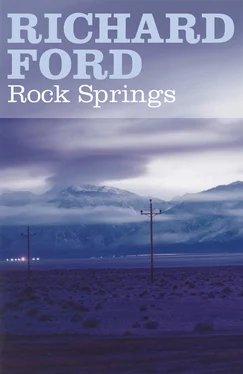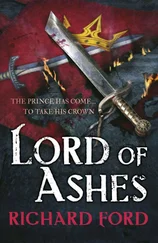Richard Ford - Rock Springs
Здесь есть возможность читать онлайн «Richard Ford - Rock Springs» весь текст электронной книги совершенно бесплатно (целиком полную версию без сокращений). В некоторых случаях можно слушать аудио, скачать через торрент в формате fb2 и присутствует краткое содержание. Год выпуска: 2006, Издательство: Bloomsbury Publishing, Жанр: Современная проза, на английском языке. Описание произведения, (предисловие) а так же отзывы посетителей доступны на портале библиотеки ЛибКат.
- Название:Rock Springs
- Автор:
- Издательство:Bloomsbury Publishing
- Жанр:
- Год:2006
- ISBN:нет данных
- Рейтинг книги:3 / 5. Голосов: 1
-
Избранное:Добавить в избранное
- Отзывы:
-
Ваша оценка:
- 60
- 1
- 2
- 3
- 4
- 5
Rock Springs: краткое содержание, описание и аннотация
Предлагаем к чтению аннотацию, описание, краткое содержание или предисловие (зависит от того, что написал сам автор книги «Rock Springs»). Если вы не нашли необходимую информацию о книге — напишите в комментариях, мы постараемся отыскать её.
Rock Springs — читать онлайн бесплатно полную книгу (весь текст) целиком
Ниже представлен текст книги, разбитый по страницам. Система сохранения места последней прочитанной страницы, позволяет с удобством читать онлайн бесплатно книгу «Rock Springs», без необходимости каждый раз заново искать на чём Вы остановились. Поставьте закладку, и сможете в любой момент перейти на страницу, на которой закончили чтение.
Интервал:
Закладка:
A month ago I saw my mother. I was buying groceries at a drive-in store by the interstate in Anaconda, Montana, not far from Deer Lodge itself, where my father had been. It had been fifteen years, I think, since I had seen her, though I am forty-three years old now, and possibly it was longer. But when I saw her I walked across the store to where she was and I said, “Hello, Dorothy. It’s Frank.”
She looked at me and smiled and said, “Oh, Frank. How are you? I haven’t seen you in a long time. I’m glad to see you now, though.” She was dressed in blue jeans and boots and a Western shirt, and she looked like a woman who could be sixty years old. Her hair was tied back and she looked pretty, though I think she had been drinking. It was ten o’clock in the morning.
There was a man standing near her, holding a basket of groceries, and she turned to him and said, “Dick, come here and meet my son, Frank. We haven’t seen each other in a long time. This is Dick Spivey, Frank.”
I shook hands with Dick Spivey, who was a man younger than my mother but older than me — a tall, thin-faced man with coarse blue-black hair — and who was wearing Western boots like hers. “Let me say a word to Frank, Dick,” my mother said, and she put her hand on Dick’s wrist and squeezed it and smiled at him. And he walked up toward the checkout to pay for his groceries.
“So. What are you doing now, Frank,” my mother asked, and put her hand on my wrist the way she had on Dick Spivey’s, but held it there. “These years,” she said.
“I’ve been down in Rock Springs, on the coal boom,” I said. “I’ll probably go back down there.”
“And I guess you’re married, too.”
“I was,” I said. “But not right now.”
“That’s fine,” she said. “You look fine.” She smiled at me. “You’ll never get anything fixed just right. That’s your mother’s word. Your father and I had a marriage made in Havre — that was our joke about us. We used to laugh about it. You didn’t know that, of course. You were too young. A lot of it was just wrong.”
“It’s a long time ago,” I said. “I don’t know about that.”
“I remember those times very well,” my mother said. “They were happy enough times. I guess something was in the air, wasn’t there? Your father was so jumpy. And Boyd got so mad, just all of a sudden. There was some hopelessness to it, I suppose. All that union business. We were the last to understand any of it, of course. We were trying to be decent people.”
“That’s right,” I said. And I believed that was true of them.
“I still like to swim,” my mother said. She ran her fingers back through her hair as if it were wet. She smiled at me again. “It still makes me feel freer.”
“Good,” I said. “I’m happy to hear that.”
“Do you ever see your dad?”
“No,” I said. “I never do.”
“I don’t either,” my mother said. “You just reminded me of him.” She looked at Dick Spivey, who was standing at the front window, holding a sack of groceries, looking out at the parking lot. It was March, and some small bits of snow were falling onto the cars in the lot. He didn’t seem in any hurry. “Maybe I didn’t appreciate your father enough,” she said. “Who knows? Maybe we weren’t even made for each other. Losing your love is the worst thing, and that’s what we did.” I didn’t answer her, but I knew what she meant, and that it was true. “I wish we knew each other better, Frank,” my mother said to me. She looked down, and I think she may have blushed. “We have our deep feelings, though, don’t we? Both of us.”
“Yes,” I said. “We do.”
“So. I’m going out now,” my mother said. “Frank.” She squeezed my wrist, and walked away through the checkout and into the parking lot, with Dick Spivey carrying their groceries beside her.
But when I had bought my own groceries and paid, and gone out to my car and started up, I saw Dick Spivey’s green Chevrolet drive back into the lot and stop, and watched my mother get out and hurry across the snow to where I was, so that for a moment we faced each other through the open window.
“Did you ever think,” my mother said, snow freezing in her hair. “Did you ever think back then that I was in love with Boyd Mitchell? Anything like that? Did you ever?”
“No,” I said. “I didn’t.”
“No, well, I wasn’t,” she said. “Boyd was in love with Penny. I was in love with Roy. That’s how things were. I want you to know it. You have to believe that. Do you?”
“Yes,” I said. “I believe you.”
And she bent down and kissed my cheek through the open window and touched my face with both her hands, held me for a moment that seemed like a long time before she turned away, finally, and left me there alone.
Fireworks
Eddie Starling sat at the kitchen table at noon reading through the newspaper. Outside in the street some neighborhood kids were shooting off firecrackers. The Fourth of July was a day away, and every few minutes there was a lot of noisy popping followed by a hiss, then a huge boom loud enough to bring down an airplane. It was giving him the jitters, and he wished some parent would go out and haul the kids inside.
Starling had been out of work six months — one entire selling season and part of the next. He had sold real estate, and had never been off work any length of time in his life. Though he had begun to wonder, after a certain period of not working, if you couldn’t simply forget how to work, forget the particulars, lose the reasons for it. And once that happened, it could become possible never to hold another job as long as you lived. To become a statistic: the chronically unemployed. The thought worried him.
Outside in the street he heard what sounded like kids’ noises again. They were up to something suspicious, and he stood up to look out just when the phone rang.
“What’s new on the home front?” Lois’s voice said. Lois had gone back to work tending bar near the airport and always tried to call up in good spirits.
“Status quo. Hot.” Starling walked to the window, holding the receiver, and peered out. In the middle of the street some kids he’d never seen before were getting ready to blow up a tin can using an enormous firecracker. “Some kids are outside blowing up something.”
“Anything good in the paper?”
“Nothing promising.”
“Well,” Lois said. “Just be patient, hon. I know it’s hot. Listen, Eddie, do you remember those priests who were always setting fire to themselves on TV? Exactly when were they? We were trying to remember here. Was it ‘68 or ‘72? Nobody could remember to save their life.”
“Sixty-eight was Kennedy,” Starling said. “They weren’t just setting themselves on fire for TV, though. They were in Asia.”
“Okay. But when was Vietnam exactly?”
The kids lit the firecracker under the can and went running away down the street, laughing. For a moment Starling stared directly at the can, but just then a young woman came out of the house across the street. As she stepped into her yard the can went boom , and the woman leaped back and put her hands into her hair.
“Christ, what was that!” Lois said. “It sounded like a bomb.”
“It was those kids.”
“The scamps,” Lois said. “I guess they’re hot, too, though.”
The woman was very thin — too thin to be healthy, Starling thought. She was in her twenties and had on dull yellow shorts and no shoes. She walked out into the street and yelled something vicious at the kids, who were far down the street now. Starling knew nothing more about her than he did about anybody else in the neighborhood. The name on the mailbox had been taped over before he and Lois had moved in. A man lived with the woman and worked on his car in the garage late at night.
Читать дальшеИнтервал:
Закладка:
Похожие книги на «Rock Springs»
Представляем Вашему вниманию похожие книги на «Rock Springs» списком для выбора. Мы отобрали схожую по названию и смыслу литературу в надежде предоставить читателям больше вариантов отыскать новые, интересные, ещё непрочитанные произведения.
Обсуждение, отзывы о книге «Rock Springs» и просто собственные мнения читателей. Оставьте ваши комментарии, напишите, что Вы думаете о произведении, его смысле или главных героях. Укажите что конкретно понравилось, а что нет, и почему Вы так считаете.












